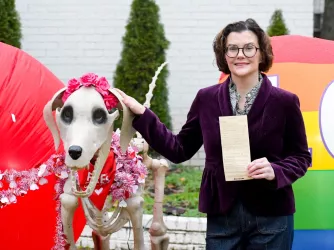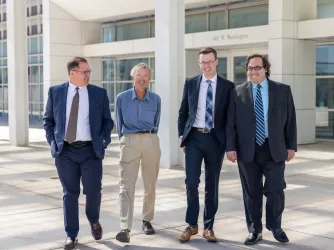Table of Contents
U. of Illinois Committee Recommends Reevaluation of Steven Salaita

The Committee on Academic Freedom and Tenure (CAFT) at the University of Illinois at Urbana-Champaign (UIUC) has released a report assessing the university’s decision not to hire professor Steven Salaita because of a series of tweets he posted to his personal Twitter account just before the university’s board of trustees was set to vote on his appointment to the faculty. CAFT is part of the university Senate and is tasked with investigating potential violations of academic freedom and shared governance. Most critically, CAFT reaffirmed in its report that, contrary to statements from Chancellor Phyllis Wise, “civility does not constitute a legitimate criterion for rejecting [Salaita’s] appointment.”
Several elements of the case have been hotly debated over the past five months. First is the question of whether Salaita was an employee entitled to academic freedom or whether he was just a potential hire. Though CAFT characterized Salaita’s status as “in-between,” it acknowledged the many reasons why the Board’s vote appeared to be essentially a mere formality, e.g., Salaita’s classes had been scheduled and posted online. Accordingly, CAFT wrote, there were “compelling reasons to grant Dr. Salaita the academic freedom and liberty of political speech normally afforded to a member of the faculty.”
The report is praiseworthy for its clear and repeated declarations that “civility” cannot be mandated among university professors. The justifications put forth by Wise, and later by the Board of Trustees when it voted against Salaita’s appointment in September, are “not consistent with the University’s guarantee of freedom of political speech,” the report says. Quoting the Supreme Court, the report reminds readers that “debate on public issues should be uninhibited, robust, and wide-open, and that it may well include vehement, caustic, and sometimes unpleasantly sharp attacks.” The report also says, as FIRE has frequently pointed out, that “civility” is too vague a standard—one that has been used “to ostracize individuals or entire social groups on the grounds that they are savage, barbarous, primitive, infantile, ill bred, or uncouth.”
The committee also found that Wise disregarded principles of shared governance in blocking Salaita’s appointment without first consulting the provost, the faculty who had recommended his hiring, or other interested parties.
Salaita may, nevertheless, face another obstacle if he continues to fight for a job at UIUC. “There are circumstances where political speech can legitimately trigger inquiry into professional fitness,” the report says, but it emphasizes that the question is “one of professional fitness, not political acceptability.” Under CAFT’s analysis, Salaita’s case may hinge on whether his tweets demonstrate that he is so politically inflexible that he is unable to engage in the kind of critical thought that is necessary in his classes. In any case, though, “Salaita should be provided the opportunity to respond to any proposed findings of professional unfitness before the body concludes its proceedings.”
CAFT concluded that Salaita’s “candidacy [should] be remanded to the College of Liberal Arts and Sciences for reconsideration by a committee of qualified academic experts.”
Check back to The Torch for updates.
Recent Articles
FIRE’s award-winning Newsdesk covers the free speech news you need to stay informed.

VICTORY! Charges dropped against TN woman cited for using skeletons in Christmas decorations

VICTORY! 9th Circuit rules in favor of professor punished for criticizing college for lowering academic standards

Free speech advocates rally to support FIRE’s federal appeal to defend advocacy in public parks
